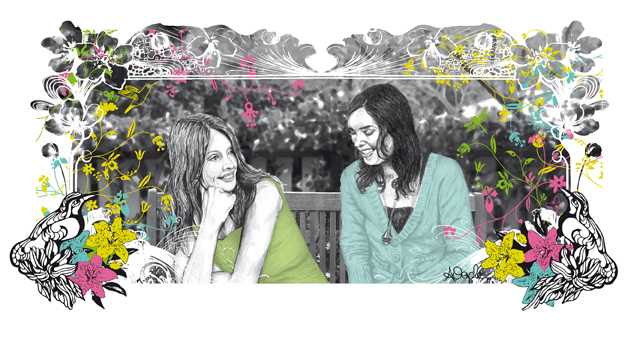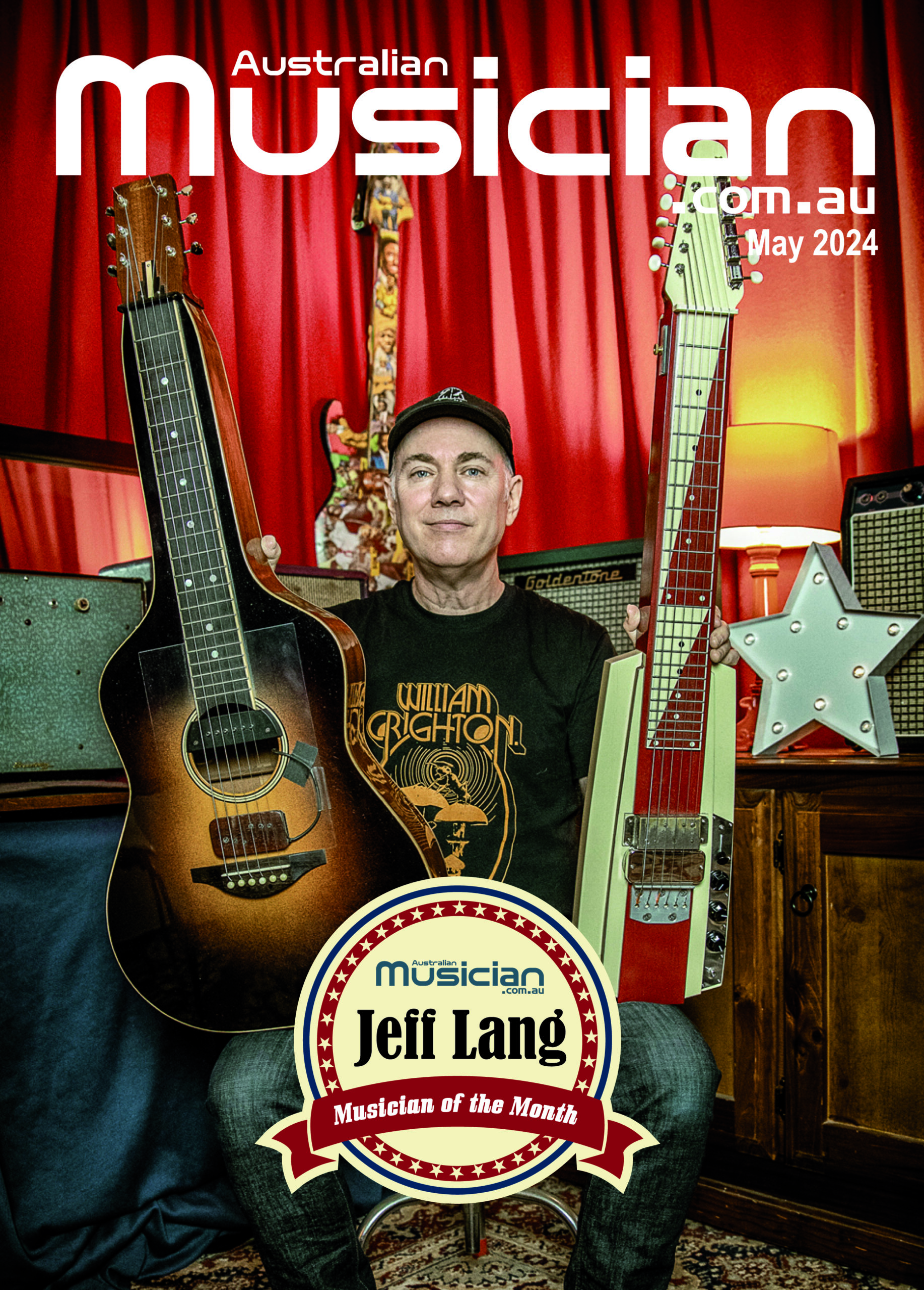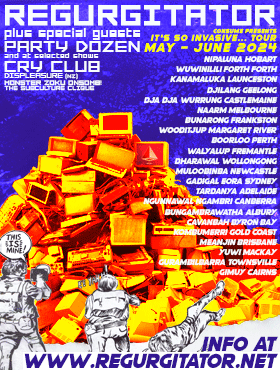HOLLY THROSBY interviews CLARE BOWDITCH
December 24, 2007 | Author: Holly Throsby
 I first met Clare Bowditch on her front doorstep. I arrived to stay the night at her house because I was doing a show in Melbourne and, even though we didn’t know each other except for a few emails, she offered me her guest room. Since then, we’ve been good friends. In our conversations we will often talk about music and the business of it. I usually ask Clare for advice. I hope, one day, that she is prime Minister of Australia.
I first met Clare Bowditch on her front doorstep. I arrived to stay the night at her house because I was doing a show in Melbourne and, even though we didn’t know each other except for a few emails, she offered me her guest room. Since then, we’ve been good friends. In our conversations we will often talk about music and the business of it. I usually ask Clare for advice. I hope, one day, that she is prime Minister of Australia.
Holly: OK, Clare … how are you feeling about your new record?
Clare: I’m feeling like I have done everything I could to make it sound good, and that everything else is pretty much out of my hands. In terms of how it sounds, I think Marty has outdone himself with it. It’s kind of a special step up in terms of production.
H: It certainly sounds a lot richer than your last record in terms of instrumentation and bigger sounds.
C: We recorded it over 18 months and we could take our time with it a bit more in that way.
H: It’s kind of racey too!
C: Rrrroooww!
H: I was wondering if you were writing from your own perspective and feeling a little pent up or telling stories.
C: No it’s completely biographical!! No not at all … um let’s scratch that from the record! This is probably my biggest work of fiction to date.
H: Yeah I was thinking it sounded a bit like that.
C: Although there are lots of stories that are real. It’s just that they’re not necessarily mine, or they are from a past that I obviously haven’t let go of yet. I think when you are pregnant people like to open up to you, and I’ve been pregnant quite a lot over the last few years. People have just been telling me their secrets and a few of them have weasled their way onto the album
H: There are a lot of indiscretions, which I thought was quite enjoyable to listen to.
C: Oh I’m glad
H: I’m sure it surprises some people because they probably have this image of you of.. you know .. when you get up and get an ARIA award while you are pregnant … I suppose they wouldn’t expect racey stories about sex in toilet cubicles and stuff.
C: I agree and I have found that one of the things that have happened since that night is that … obviously with a new album I have to do a lot of interviews .. and a lot of the interviews have been focused around the fact that I am a parent rather than a songwriter. I feel sometimes like I am supposed to be some kind of spokesperson for cool mums who are trying to do it all. That doesn’t sit comfortably with me at all because having children and writing music are completely separate entities in my life. I get asked very personal questions like who is baby sitting my children and what was my birthing experience like and how long I breast fed for. I struggled with how to come to terms with politely .. um , I mean for me it’s the most important thing in the world. The most lovely thing in the world but it’s a private and personal thing. As a female singer songwriter, people always assume that what you are singing about is A) yourself and B) that they can ask you any questions in the world. It’s kind of our fault as well. I should have just stayed indoors when I was pregnant.
H: It’s a bit hard to accept an award when you’re indoors.
C: I should have accepted via satellite. Look, I’m happy and proud to be out there as who I am but …
H: I think there is always one little thing people know about a particular artist and if it is written in your bio, that’s all they ever ask you about in interviews. Like you’re the mother one and Sarah’s (Blasko) the
ex-religious one and everyone has got something that ..
C: So what are you?
H: I don’t know. For my first interview I was the video store girl because the bio said I worked in a video store. I tell you every single interviewer asked me about working in a video store. It was so boring. It was like, yeah, but that’s not really what the songs are about.
C: I guess what I’m saying is that people are going to ask you whatever they can ask you to make the story interesting. In some ways it’s up to the performer to be able to articulate the work in an interesting enough way that it can be the crux of the interview. Which is a skill, probably.
H: I like the lyrics on the new album, I think they are really good. I like the series of visceral images that keep coming up, like people that have fat fingers and thighs and stuff like that. I was like clutching my pearls listening to some of them thinking .. Clare .. honestly!!!
C: Goodness me!
H: Goodness me! No it was good being quite red blooded lyrically.
C: In a way I suppose it’s just about the most human of things. These lusty fiery driving emotions.
H: Also I find your melodies quite unusual. They are very specific to you, especially on the first track on the record. The timing of it and the way the melody goes. The first time I listened to it, I found it completely odd. When you are writing songs, do you feel they naturally go in an odd way?
C: I kind of don’t. Because I haven’t had voice training and that has meant I am free to go in whichever direction I want because I refuse to know the rules. I try to keep it as interesting as I can for me.
H: The songs kind of take little left hand corners quite quickly and the first time you hear it, you go ‘whooa’ a little. It sounds like pop music in a way but also subverted in another way which makes it interesting
C: One of the things we, Marty and I, were trying to do with this album … we talk a lot about how boring most commercial radio is at the moment and how boring radio can be and how narrow our definitions are as to what makes a popular song these days. There’s a certain time limit, there has to be this amount of verses and choruses and so on if it’s to be picked up by the masses. So I guess we just decided to quite blatantly broaden our definition of what could be good and listenable popular music. And it does take a bit of a leap on behalf of the listener half of the time because it’s not as easily hookable as songs by some other artists, but that’s OK.
H: You seem to play with words like no one else does, just in terms of singing them.
C: Really?
H: Yeah, I counted you got seven syllables out of the word ‘now.’
C: I did not!
H: You did. It’s one of the last songs on the record about ‘coming home with someone tonight’, about track nine, and in the first verse you say the word now, and you get seven syllables out it. I love it! I was cracking up.
C: You’re right actually.
H: It’s good to have your own vocal style. You gotta own that.
C: Well I don’t know any other way to do it.
H: Do you find that you are inspired more by literature than you are by other music?
C: I was for this album actually.
H: Because I know you thank writers and stuff in your liner notes.
C: Yeah I do, because for some reason that just feeds quite directly into making up images for songs. Of course melodically, there are all sorts of influences, there must be but I always struggle to pinpoint them. It’s quite easy for me to say … a song like ‘That Wouldn’t Be So Good’ … that was literally written straight after reading Dirt Music. I wrote this in part of the essay which was real as opposed to the rest of the fiction, but there was also this Leunig poem on my toilet wall for a couple of years.
H: I remember seeing that when I stayed at your house.
C: Yeah just a cute little daggy thing, but yes I find words inspiring.
H: Sometimes one whole song comes out of one word. A song will come out with a word attached to it.
C: So are you someone who can pinpoint your process? Do you get melody? Word?
H: Always a melody comes attached to the guitar part because
I always write with the guitar or piano. I sometimes find that melodies come out with words, like even whole sentences have come out all at once. And sometimes a whole song will be based around that one phrase. It often has to do with vowel sounds. A whole song will seem like one massive vowel sound to me.
C: Aaa eee iii!
H: It’s funny but sometimes songs come out ready written and other times, you really have to work at it. It is a very unscientific art. It’s not very structured for me.
C: No, me neither and I think if I worked out what the structure was, it would be like someone popping the balloon. I would hate to really know exactly how it happens.
H: Yeah, there is a nice sense of mystery to it.
C: I hear about songwriters who sit down at 9am on Monday morning through to 5pm and it’s like a day job.
H: I think Nick Cave does that.
C: So I’ve heard. He goes into an office and I know Mia Dyson had been practising writing in that way at one point., trying to install some discipline. But that’s a wonder to me. It kind of amazes me but I guess that’s just part of being present and who knows what will come up. That’s something I just couldn’t choose to do at the moment, but maybe something I might try a little later down the track.
H: You know how we always get lumped in together and I know it annoys you and it annoys me …
C: Actually I quite like it.
H: I don’t mind it so much these days but it really annoyed me with my first record. I think I don’t mind it now because I know so many of the girls.
C: I know. I have had the same kind of journey with it. It shat me because I wanted to be seen for what I was, not to do with the fact that I had boobs. then I came around to realising there was a compliment in it and also it is something interesting that has happened. There is an interesting bunch of women songwriters who have been allowed to come to the forefront of general consciousness because we’re not as stuck in having to sell records for record companies. We have other ways of recording and other ways of promoting ourselves now. Does that make sense?
H: It does make sense. Do you feel that there is a community feeling amongst those women?
C: I could be fooling myself but yes I do. In my heart there is a feeling that there is enough room for everyone. As years go by and we each develop our own style, it will just be taken for granted that we are different entities. We won’t all be lumped in the same stroke any more. I really like and admire a lot of the women making music in Australia and I have kind of made a point of making contact with them over the years and letting them know that I like and admire what they do.
H: Yeah that’s a good thing to do.
C: And some are more responsive than others. I think that was the way we met … that I wrote to you and told you I loved your album.
H: Yeah you did. It was so sweet.
C: I did love it. Then I was playing at a festival and Missy Higgins said to me, have you heard of this girl Holly Throsby? Then I email introduced you two.
H: Yeah that was good. It was like ‘Molly … Hissy!’ in the subject line and I was like … what does that mean?
H: Obviously you would have been pushed more into the mainstream since the ARIAs. Do you find that you still identify a lot more with the fringe area of the arts in general?
C: I do and that’s part of my make up. I came up through the Melbourne indie scene. All of my friends are indie musicians. The fact that I sang a song with Bernard Fanning and Kasey Chambers at the ARIAs, it means a few more people know who I am but generally I’m lovely and anonymous. And because I dropped straight out of the public eye pretty much as soon as that happened … I think also that our music doesn’t really lend itself to … I can’t imagine we’ll ever be a mainstreamly accepted band, If that make sense?
H: I feel the same way about my music but isn’t it surprising sometimes though. Like when Kasey Chambers won her first ARIA, I remember being so excited about that.
C: I know. Me too!
H: I see you as a person a lot broader than just your music that you make. I think because of the way you work your website. You know how you write open letters and you voice your opinions on other issues and your acceptance speech at the ARIAs was so awesome when you gave it to Steve Bracks and stuff. There’s this line in your record where you say “I will not live a little life”. I’m not sure if that is directly from you but it kind of feels like it is. Do you feel like you’ll do something apart from music … incorporate a wider spectrum?
C: I have always been someone with opinions and I think in this particular moment in history and time, in our country, I am really enjoying hearing other people’s opinions. Obviously educated opinions. I can’t really claim to be sure of what I am talking about, a lot of the time… but I am happy to speak from the heart. My general thinking is that it would have been nice to make music and stay anonymous. That would have been my ideal way of doing it. I wanted to keep them separate, but you can’t.
H: I don’t think your personality would have let you do that.
C: It kind of did for the first album, but I think as soon as you get a little bit of recognition and then you start doing interviews, and getting questions and you start giving your opinions, then I think from that point onwards you can’t really hide it anymore. You can either talk about really bland safe things or you can take a risk every time and actually answer the questions that you are asked in some way that speaks for something and means something to you. I guess I made a decision that I would do that and also that I would try and never perpetuate this bullshit about people that are in the public eye are somehow being .. how do I put it? Being all facade. I just decided that’s no way to contribute to a better world really. I don’t know if I have worded that correctly but … I just decided the best thing I could do, the only thing I could do and the only thing I could keep up, is being myself. I guess that’s why I have always been happy to give my opinions.
www.clarebowditch.com www.hollythrosby.com
illustration by Ammber Doyle www.myspace.com/ammberdoyle


